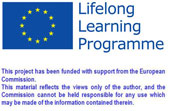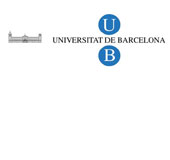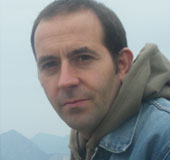
Webmaster: Pinzani.it
You are in: Homepage > Members > Project Partners > Partner's Form
| Name of the organisation: | Universitat de Barcelona |  |
| Address: | Gran Via de les Corts Catalanes, 585 08007 Barcelona |
|
| Tel: | 0034 93 4021187 | |
| Fax: | 0034 93 4035380 | |
| Web site: | www.ub.edu |
| Name of the contact person: | Javier San Julián Arrupe |  |
| Function: | Assistant Professor | |
| Address: | Departament d’Història i Institucions Econòmiques Facultat d’Economia i Empresa Diagonal 690, 08034, Barcelona - Spain |
|
| Tel: | 0034 93 4021928 | |
| Fax: | 0034 93 4024594 | |
| E-mail: | [email protected] |
| Type of organisation: |
|
| Fields of action: |
|
| DESCRIPTION OF THE ORGANISATION |
The University of Barcelona (UB) is the largest public institution of higher education in Catalonia, catering to the needs of the greatest number of students and delivering the broadest and most comprehensive offering in higher educational courses. The UB is also the principal centre of university research at a state level (it publishes more research than any other Spanish institution with the exception of the Spanish National Research Council, CSIC) and has become a European benchmark for research activity, both in terms of the number of research programs it conducts and the excellence these have achieved. In 2008 the UB had 37 institutes and research centres, and more than 5,000 full-time researchers, technicians and research assistants, most of whom working in the UB’s 229 research groups and in 639 active research projects. In that year, UB's total income from research and technology transfer amounted over 90 million euro. Research activities are managed by the UB office Research Management (OGR), which is in charge of national research programs, the UB office European Research Projects (OPER), which is responsible for European projects, and the Bosch i Gimpera Foundation (FBG), which oversees knowledge transfer and relations with the business sector.
The Department of Economic History and Institutions of the UB, currently made up of 45 scholars, is regarded to be one of the most active and innovative centres in Economic History in Spain. It is well known not only for the research developed in the fields of history of industry and finance, business history, history of economic ideas, agrarian and environmental history, and studies on globalization and long-term inequality, but on its graduate and postgraduate courses as well. Currently, it teaches various courses in the degrees of Economics, Business Administration and Management, Sociology, Political Science, Public Policies and Labour Relations. In 2007 the Department created the research institute Centre d'Estudis Antoni de Capmany. The Revista de Historia Industrial, one of the leading journals in the field, has been published by this Department since 1992. It has created, jointly with the Department of Economic History of the Autonomous University of Barcelona, the Interuniversity Doctorate Programme on Economic History and Institutions. This PhD programme, which has attracted students from various countries in Europe and Latin America since 1991, has been recognized by the Spanish Ministry of Science for its high quality, and has offered students the possibility of writing a wealth of PhD thesis. The Department has a strong commitment towards teaching innovation. Since 2009, all members are taking part in the Teaching Innovation Group in Economic, Political and Social History, financed by the University of Barcelona. Besides, some of them are also enrolled in other four different teaching innovation projects financed by the Catalan government. |
| EXPERIENCE OF THE ORGANIZATION IN PREVIOUS EUROPEAN PROJECTS |
Projects in which the University of Barcelona has participated with the financial support of Community Programs or Initiatives in the past 3 years:
|
| CONTRIBUTIONS THAT CAN BE PROVIDED TO THE PROJECT | Our contribution as a partner of the EE-T project covers all the objectives that this project aims to achieve. In the research field, this group has a valuable experience in dealing with the diffusion and transmission of economic ideas, among which translation stands out. Spain is a case of economic ideas receiver, whereas very few original economic works have been produced here. Therefore, translation has been the most important way of diffusion of economic ideas in this country. As for the spread of the e-platform as a tool for study and research, and of the rest of the outcomes of the project, the support of the department of Economic History and Institutions of the University of Barcelona ensures a successful performance. |
| REASONS OF INVOLVEMENT IN THE PROJECT |
A specific area in the Department of Economic History of the University of Barcelona is dedicated to studies on the history of economics and of economic ideas. This area is in charge of teaching some courses on the history of economic thought, both in undergraduate level (a compulsory course in the last year of the Degree in Economics) and in Master's degree (Master in Economics). A core line of research within this area concerns the processes of institutionalisation of political economy and of transmission of economic ideas, particularly in Spain. Specifically, research work has been done on the process of consolidation of economics in environments such as universities and schools, academies, economic associations, scientific journals, etc. The diffusion of foreign economic ideas in Spain has also attracted attention, especially concerning the spread of these ideas in the political realm, mainly the Spanish Parliament, and its influence in policymaking. Most members of the team taking part in the EE-T project belong to this area of the Department.
The characteristics of the Department and the area of history of economics within it suit rightly the tasks and objectives of the EE-T project. Expertise of the team members in economic history and in history of economic ideas, particularly in the fields of research in institutional history and means of diffusion of economics, guarantees the accomplishment of the research part of the EE-T project. Team members’ wide experience in teaching makes certain that the project works will give priority to the construction of a useful tool for education. Last, commitment to innovation in teaching, not only of the team members, but also of all members of the Department, ensures that the online platform of digital texts will be immediately appreciated and applied in teaching tasks. In this concern, it is worth to highlight that using original economic texts as complement to lectures is essential in many of the courses taught by the Department, particularly those in Master’s degree and those on history of economic ideas. In short, this team fulfils the main aim of the EE-T project, namely to create a triangle of knowledge between research, education and innovation thorough ICT tools. |
| CONTACT PERSON’S EXPERIENCE AND EXPERTISE |
Javier San Julián is Assistant Lecturer at the Department of Economic History of the University of Barcelona. His fields of research are history of trade, institutionalisation of political economy and transmission and diffusion of economic ideas, particularly in the realm of politics. His PhD dissertation, "The spread of economic thought in the Parliament and the institutionalisation of political economy in Spain, 1868-1900" (2008) was directly connected to this topic. He is taking part in the Group of Teaching Innovation in Economic, Political and Social History supported by the UB, and in the Project to Improve Teaching Quality “On-line Tools in Economic History Teaching”, financed by the Catalan government. He is teaching a course in History of Economic Thought in the Master's degree and a course in History of Economic Doctrines in undergraduate level.
Most recent publications:
|


NEWS
The international conference entitled Translations of Economic Texts into and from European Languages, organized in the framework of the EE-T project, was held at the University of Pisa (Italy) on 11 to 13 September. The aim of the conference was to present the results of researches carried out throughout Europe on the international circulation of economic ideas through translations and adaptations of economic texts. The three days event was attended by around 100 participants representing: lecturers, researchers, students in the field of history of economic thought. More information is available in the Events section